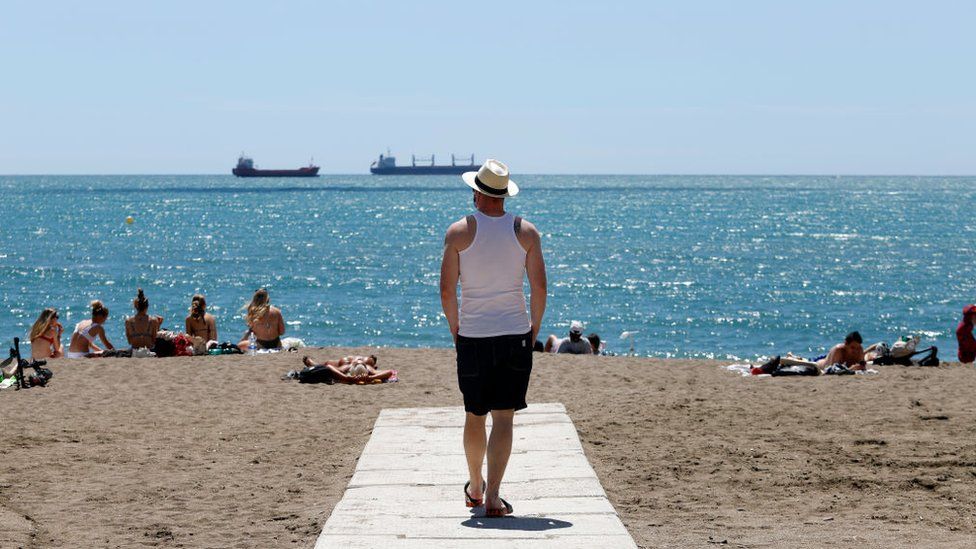Vaccine passports: How can I prove I’ve had both my Covid jabs?on June 25, 2021 at 3:31 pm
People who’ve had both Covid jabs may soon be able to avoid quarantine after travel.

image copyrightGetty Images
The government says it wants to drop quarantine for fully vaccinated people returning from amber-list countries “later in the summer”.
It could mean those who have had both jabs would be able to use proof of vaccination to travel more widely.
There are only a few countries people from the UK can visit without having to quarantine for 10 days on return. These are the green list countries.
Most popular holiday destinations are on the amber list and the government currently advises against travel to them.
The government says it will give more details of plans to drop quarantine for fully vaccinated people in July.
The plan is to start with UK residents – although there will still be a requirement to take Covid tests.
People in England can request an NHS Covid Pass via the NHS website or the NHS app.
This is different to the NHS Covid-19 app, which is used for contact tracing. You must be registered with a GP surgery to use the NHS app.
Once logged in you can request an NHS Covid Pass. The the system will generate a QR code, which lasts for 28 days. You can download a PDF copy or have it emailed to you.
You can get an NHS Covid Pass two weeks after your second dose of the Covid vaccine, as long as both doses were given in England.
You can also request a pass if you’ve had a negative PCR test or lateral flow test result within the past 48 hours, which you’ve reported on the NHS website. These passes last 48 hours after the test result.
Alternatively, you can request a pass if you’ve had a positive PCR test result within the last six months, and have finished self-isolating. In this case the pass lasts for 180 days after the rest result.
People who have had both their jabs can also request an NHS Covid Pass letter by calling 119. This will not show test results, only vaccination status, and has no expiry date.
At the moment, under-16s can’t get an NHS Covid Pass, because children aren’t currently being vaccinated.
The NHS Covid Pass can already allow people to enter countries which accept proof of vaccination status, potentially without having to isolate on arrival.
Some countries recognise information on the NHS app, or a letter from the NHS, as proof of vaccination status.
In France, for example, fully vaccinated adult travellers from the UK do not have to self-isolate if they can show either of these (although other documents are also required).
But you should still check entry rules before you book to go.
From 30 June in Malta, for example, you will have to quarantine for two weeks if you can’t prove you are fully-vaccinated. Discussions are ongoing over whether Malta will recognise UK-issued vaccine certificates.
The Events Research Programme is trying different ways to run large events safely, including concerts, nightclubs and sporting fixtures.
These events are exempt from the wider coronavirus regulations such as the rule of six.

image copyrightGetty Images
As part of the scheme, spectators attending Euro 2020 matches at Wembley Stadium have been asked to show their NHS Covid Pass or provide a negative lateral flow test result.
People in Scotland aged 16 and over can request a paper copy of their coronavirus vaccination status online via the NHS inform website, or by calling 0808 196 8565 if they are due to travel in the next 14 days.
People in Wales can’t yet access a digital certificate showing their vaccination status.
But you can request a paper certificate of vaccination by calling 0300 303 5667 if you:
- Have had both doses of the vaccine (and it’s at least five days since the second dose)
- Urgently need to travel to a country which requires vaccine certification
- Can’t either quarantine or provide tests to meet the country’s entry requirements
Work on a paper-based Covid vaccination certificate has begun in Northern Ireland, and should be ready by mid-July. Digital certificates should be available later in the summer, and will include test results.
The government has said there will be some places where Covid passports will never be required – such as essential shops, public services, and public transport.
It has also said there will be exemptions for some people “for whom vaccination is not advised, and repeat testing is difficult”.
Prime Minister Boris Johnson previously suggested venues like pubs might be able to ask for proof of customer’s vaccination status once all adults had been offered jabs.
It’s hoped all adults will have had their first dose, and everyone aged over 50 – and the clinically extremely vulnerable – will have been offered their second, by 19 July.


